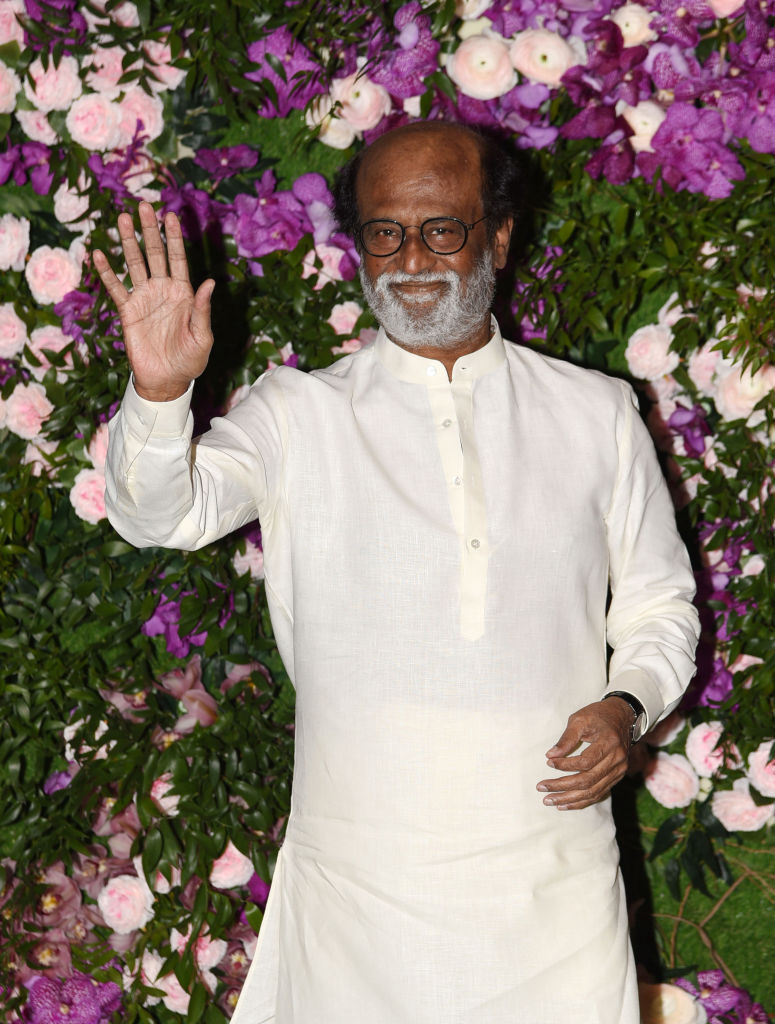
- Industry
Global Star Profiles: Rajinikanth
At the Venice Film Festival in 2015, a documentary called For the Love of a Man premiered. The subject was a star of South Indian cinema called Rajinikanth and the unbelievable cult of fandom that exists around him. Considered almost a demigod by his fans, Rajinikanth, in his four-decade career, has amassed a devout following that is unheard of by western standards. The movie shows several examples. One man displays a receipt from a pawn shop of the sale of his wife’s jewelry to finance a fan club event (one of 150,000 such clubs all over the world). Others are shown to continuously watch his movies on a loop. His birthday celebrations span 12 days. One printing press only makes posters of him. When Rajinikanth was hospitalized in Singapore, fans dropped everything to fly there to be near him.
His fans are on a whole different plane from those of Bollywood actors, or indeed any others. (The closest one can find a comparison may be Rudolf Valentino whose death caused several fans to commit suicide.) Rajinikanth’s fans bathe statues of him with milk on the opening day of his films. They jam cinemas and cause riots if screenings are sold out. Businesses close down the day of a Rajinikanth premiere to avoid employees calling in sick. Fans who set off firecrackers on the street and pay thousands of rupees for tickets. They expect the projectionist to pause the film at his first appearance so they can cheer him, while the front row offers up prayers for him. His movies are paused midway so that his song and dance numbers can be replayed. And he is always top-billed as “SUPERSTAR Rajni” with cascading lights or shooting stars surrounding his name.
Rajinikanth is an unlikely star. He is now 69, balding, and never had the sleek good looks and light skin color of other Indian movie stars. Part of his popularity seems to be his humility in real life. Unlike Bollywood stars, Rajinikanth isn’t seen out in public much. When he is, he is dressed simply in a dhoti and rubber chappals, and he doesn’t hide his baldness. He doesn’t churn out movies one after the other so that each release every two or three years becomes an event. He doesn’t do interviews. He doesn’t do commercial endorsements. He quietly gives to charity.
Most of his characters are Everymen who overcome adversity to save the people/right wrongs/get the girl in typical masala movies that are part drama, part comedy, part musical. The persona he plays is what the fans want and that involves tailoring every script to his strength – playing a hero who is a man of the people. There are the mannerisms, carefully cultivated, of flipping cigarettes into his mouth, tossing his hair, pointing with shooting fingers, and even chewing gum with a swagger and style that is typically his. And Rajinikanth is famous for his signature dialog and punch lines, crafted meticulously to be memorized and repeated by admiring fans. Special screen credit is given to his dialog writers, though it must be noted that that is common in Indian cinema.
Shivaji Rao Gaekwad was born in Bangalore in 1950 and was named after the Maratha warrior-king Chhatrapati Shivaji. He was a carpenter, porter, and bus conductor before starting his acting career on the stage, in mythological dramas in his native Kannada language. On the advice of a film director, he learned Tamil and was soon cast in villain roles in Tamil cinema. He went on to act in more than 200 films in Tamil and Malayalam, and also a handful of Bollywood films.
In 2010, he starred in the most expensive Indian film ever made, the techno-thriller Endhiran with Aishwarya Rai, which was the highest-grossing Indian film up to then. It was also dubbed in Hindi. That year, he was the second-highest-paid actor in Asia after Jackie Chan – he earned $8.9 million for Endhiran. The online magazine Slate said of him before the movie’s release: “He is no mere actor – he is a force of nature. Onscreen, when Rajinikanth points his finger, it’s accompanied by the sound of a whip cracking. When he becomes enraged, the director cuts to a shot of a gorilla pounding his chest or inserts a tiger roaring on the soundtrack. Echo is added to enhance his ‘punch dialogues,’ rhyming lines uttered at moments of high drama. “When I will arrive, or how I will arrive, nobody will know, but I will arrive when I ought to,” he snarls, confusingly. Or, “I will do what I say. I will also do what I don’t say.” Then he punches some goon so hard that he flies through the windshield of a minivan and continues on out the back window. Can’t argue with that.”
In the latest chapter of his life, Rajinikanth has announced political ambitions. He has started a political party, Rajini Makkal Mandram, where he expects to play kingmaker to a new wave of young politicians in the 2021 state elections in Tamil Nadu. He said he himself doesn’t expect to run for the post of Chief Minister.
Rajinikanth has received several honors from the Indian government, among them the Padma Vibhushan, India’s second-highest civilian honor in 2016.